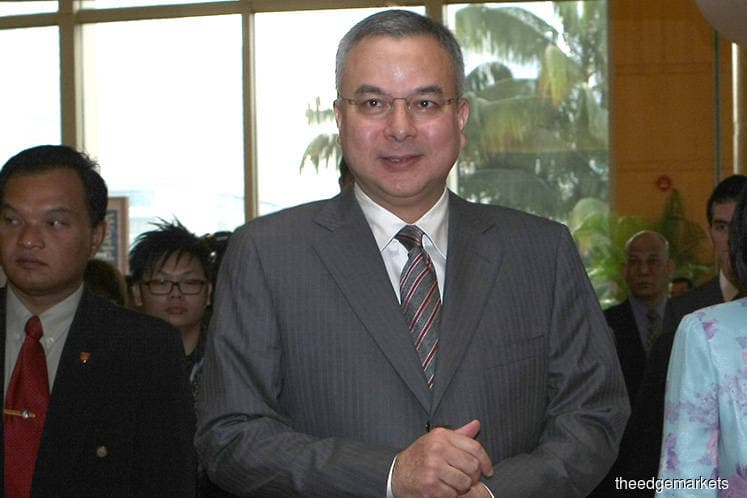
KUALA LUMPUR (Aug 14): The ruler of Perak, Sultan Nazrin Shah, has called for deeper reforms in restoring the rule of law, which he says is not a task that can be undertaken with "small steps, cynical compromises and half-hearted measures".
In his keynote address at the International Malaysia Law Conference today, Sultan Nazrin said it is not sufficient to tackle only the individuals most directly responsible for the breakdown of the rule of law.
"Institutions and processes must also be fundamentally reformed and strengthened, in order to safeguard against relapse. This endeavour is likely to meet with fierce resistance, especially in settings where the networks and cultures of corruption and abuse of power have penetrated deep into the fabric of society, becoming almost de facto norms.
"The necessary institutional reforms may have to take place in the midst of such entrenched interests and determined pushback by those affected," he said.
The ruler shared four ideas about what these deeper reforms should entail.
"First, a separation of powers must be implemented as completely and effectively as possible within the limits of governing systems. In parliamentary democracies such as Malaysia, control over the executive branch is the direct result of commanding a majority in the legislature.
"Members of the legislature owe their first allegiance to the nation itself, as set out in their oaths of office. In this country, their responsibility is to bear true faith and allegiance to Malaysia and to preserve, protect and defend its Constitution.
"Although some influencing of the legislature by the executive may be unavoidable, the separation of powers within government must be consistently maintained through these and other means," he said.
Sultan Nazrin said the second important aspect closely related to the separation of powers is judicial independence.
"Judicial independence is especially important in parliamentary systems, where the executive and the legislature are to some extent fused.
"In keeping with human nature, even the fairest-minded of judges may be influenced and swayed by their own worldviews and personal predispositions.
"The judiciary should therefore be drawn from as diverse a range of gender, ethnic and cultural backgrounds as possible, to ensure the equitable administration of justice.
"It is also important for judges to have guaranteed security of tenure, so that they are able to conduct their work shielded from undue intimidation and fear," he said.
As a third important step, the sultan said countries should accede to and ratify existing international instruments, and ensure closer national compliance with them.
"If there is one international instrument to which all countries should voluntarily accede to out of a sense of enlightened national interest, and on which countries should intensively cooperate, it is the 2003 UN Convention Against Corruption (UNCAC).
"The UNCAC, which Malaysia signed in 2003 and ratified in 2008, is aimed at the prevention, investigation and prosecution of corruption, and the freezing, seizure, confiscation, and return of its proceeds.
"This international convention does have its limitations, but it is an essential element of international legal structures, which is supplemented by bilateral mutual legal assistance agreements. Only through such means can the ability of the executive to delay or stymie investigations into corrupt practices, in which they themselves may be implicated, be minimized," he said.
The fourth and final measure that Sultan Nazrin outlined concerns the success and longevity of the reforms.
"For these to be sustainable, countries must work towards developing a 'whole-of-society' approach to the rule of law. For too long, we have left the fight to jurists, to the legal fraternity and to the activists of civil society, often at great personal sacrifice.
"Large segments of the adult and voting population have excused themselves from responsibility, on the grounds that they lack sufficient knowledge about the law, in order to get on with their personal lives. But the rule of law and the administration of justice are far too important to be left to a select few.
"A 'whole-of-society' approach recognizes the crucial roles played by all stakeholders, individually and collectively, through civil society organizations, academia, the media and other channels, and also strategically coordinates them in meaningful ways," he said.
The ruler stressed that a healthy and functioning democracy is not just one that gives voice to different constituencies during the elections.
"Rather, it is one in which the law creates a boundary beyond which none, no matter how powerful, may trespass without penalty.
"Citizens must grasp that a robust rule of law means that they cannot pick and choose amongst judicial decisions, supporting only those which favour their own interests, and rejecting the very concept of the rule of law when it goes against them.
"A 'whole-of-society' approach, in contrast, requires that all develop an innate respect for the rule of law and for legal institutions, even when individual rulings contravene their own interest," he said.
Meanwhile, Sultan Nazrin said the recent change of government in Malaysia has given fresh impetus to efforts to strengthen the rule of law in the country.
"Laws that are deemed restrictive of individual liberties are being reviewed. Efforts are underway to remove undue constraints on the media.
"Steps are being taken to remedy and revitalise the core institutions of democracy and good governance, including the Election Commission, Parliament, the judiciary, the regulatory and enforcement agencies, and the Malaysian Anti-Corruption Commission. We look forward to all these important initiatives reaching full fruition. The people of Malaysia and the country deserve no less," he said.